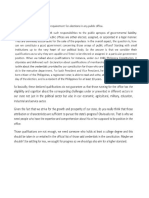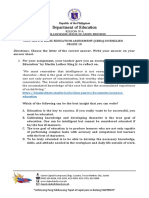0 ratings0% found this document useful (0 votes)
494 viewsEditorial Inflation by Mimosa
Editorial Inflation by Mimosa
Uploaded by
Capt KarliThe document discusses inflation in the Philippines and whether the TRAIN law is responsible. It notes that prices for rice and other basic goods have risen sharply in recent months, straining many Filipino families' budgets. While the TRAIN law lowered some taxes, it also increased taxes on certain products. Two other factors contributing to inflation are rising global oil prices and the weakening peso currency. To curb inflation, the government and citizens need to save more and consume less, reducing overall demand in the economy. Ultimately, the document concludes that while TRAIN may have played a role, there is no single party to blame for the current price increases.
Copyright:
© All Rights Reserved
Available Formats
Download as DOCX, PDF, TXT or read online from Scribd
Editorial Inflation by Mimosa
Editorial Inflation by Mimosa
Uploaded by
Capt Karli0 ratings0% found this document useful (0 votes)
494 views2 pagesThe document discusses inflation in the Philippines and whether the TRAIN law is responsible. It notes that prices for rice and other basic goods have risen sharply in recent months, straining many Filipino families' budgets. While the TRAIN law lowered some taxes, it also increased taxes on certain products. Two other factors contributing to inflation are rising global oil prices and the weakening peso currency. To curb inflation, the government and citizens need to save more and consume less, reducing overall demand in the economy. Ultimately, the document concludes that while TRAIN may have played a role, there is no single party to blame for the current price increases.
Original Description:
wqew
Copyright
© © All Rights Reserved
Available Formats
DOCX, PDF, TXT or read online from Scribd
Share this document
Did you find this document useful?
Is this content inappropriate?
The document discusses inflation in the Philippines and whether the TRAIN law is responsible. It notes that prices for rice and other basic goods have risen sharply in recent months, straining many Filipino families' budgets. While the TRAIN law lowered some taxes, it also increased taxes on certain products. Two other factors contributing to inflation are rising global oil prices and the weakening peso currency. To curb inflation, the government and citizens need to save more and consume less, reducing overall demand in the economy. Ultimately, the document concludes that while TRAIN may have played a role, there is no single party to blame for the current price increases.
Copyright:
© All Rights Reserved
Available Formats
Download as DOCX, PDF, TXT or read online from Scribd
Download as docx, pdf, or txt
0 ratings0% found this document useful (0 votes)
494 views2 pagesEditorial Inflation by Mimosa
Editorial Inflation by Mimosa
Uploaded by
Capt KarliThe document discusses inflation in the Philippines and whether the TRAIN law is responsible. It notes that prices for rice and other basic goods have risen sharply in recent months, straining many Filipino families' budgets. While the TRAIN law lowered some taxes, it also increased taxes on certain products. Two other factors contributing to inflation are rising global oil prices and the weakening peso currency. To curb inflation, the government and citizens need to save more and consume less, reducing overall demand in the economy. Ultimately, the document concludes that while TRAIN may have played a role, there is no single party to blame for the current price increases.
Copyright:
© All Rights Reserved
Available Formats
Download as DOCX, PDF, TXT or read online from Scribd
Download as docx, pdf, or txt
You are on page 1of 2
Editorial Writing (English)
By: Mimosa Villarin
Inflation spikes: Is TRAIN to blame?
We’re once again strangled by the despots we are
experiencing right now. Rice prices are at a 3-year high.
Suchlike, the increase in prices of basic commodities, not only
sugared and luxury goods. Gas pump prices now swell between
55 pesos to 60 pesos per liter. The menu prices of most of the
Restaurants and food stall have now revised. With this recent
Inflation spikes most of the Filipinos’ weekly budget for
groceries, especially in the poor sectors might buy fewer items
than before. Lots of Filipinos are dazing with this recent
acceleration of prices, which is no relief in sight. Why is it all
happening? What should we have to do to cushion its impact?
Which is especially the government must do also. Is TRAIN law
need to blame with this?
On January 1, was the implementation of the Tax
Reform for Acceleration and Inclusion (TRAIN) law. The law
aims to reduce the personal income taxes of the citizens. Its
implementation relates to the fact that those having an annual
taxable income of 250, 000 pesos and below at least 21, 000
pesos a month is now exempted from personal income tax.
However, those people who have a taxable income of 250, 000
pesos above would be opted to tax rate.
Whereas, while TRAIN law cuts some taxes it also
increases taxes on some products. Thus, increase of the
inflation rate happens.
According to the research, the two international
factors that could explain the reason of this inflation spike are
the recent surge in oil prices and the weakening of the peso. On
the other hand, world oil demand is higher because of the
economic growth worldwide is so quick. In the Philippines,
higher world oil prices have been particularly painful because of
the weaker peso and TRAIN. The weaker peso elaborates the
impacts of the higher oil prices. Hence, this weaker peso is now
at a 12-year low.
At this point, the government can do to minimize its
impact is by inducing households to save more and more
consume less, which is the only thing the Filipinos must do also.
Reduce the overall demand in the economy and prevent prices
from rising further. In short, there is no one to blame for the
law’s scarcity other than themselves.
You might also like
- English: Quarter 1 - Module 3: Loving Its MeaningDocument26 pagesEnglish: Quarter 1 - Module 3: Loving Its MeaningAngel Mantalaba88% (8)
- Capsule Research Proposal Format: A. Basic InformationDocument2 pagesCapsule Research Proposal Format: A. Basic InformationCapt Karli50% (4)
- 13 TubayDocument36 pages13 TubayCapt Karli67% (3)
- Assertions 20 21 PDFDocument41 pagesAssertions 20 21 PDFRudy Pascual AquinoNo ratings yet
- A College Diploma Affirmaticve and NegativeDocument9 pagesA College Diploma Affirmaticve and NegativeJovelyn D. SinlaoNo ratings yet
- Answer Sheet Gen Math Mod 9Document6 pagesAnswer Sheet Gen Math Mod 9ahlsy CazopiNo ratings yet
- Week 3 4 Modules 8subjects PDFDocument139 pagesWeek 3 4 Modules 8subjects PDFmae KuanNo ratings yet
- Narrative Report Oplan Bayanihan 2019Document6 pagesNarrative Report Oplan Bayanihan 2019NOMER NAVARRO VARUANo ratings yet
- Economic Development: (Homework)Document2 pagesEconomic Development: (Homework)KianaAldini0% (1)
- Edited - Performance TasksDocument3 pagesEdited - Performance TasksErneng TutpickNo ratings yet
- How Dependent Are We On TechnologyDocument1 pageHow Dependent Are We On TechnologyRandy EdradaNo ratings yet
- Information Gathering For Everyday Life Usage: Module in English 10Document19 pagesInformation Gathering For Everyday Life Usage: Module in English 10Lilah Blair100% (2)
- Specifically, It Sought To Answer The Following QuestionsDocument6 pagesSpecifically, It Sought To Answer The Following QuestionsMark Francis MunarNo ratings yet
- A Day in The CountryDocument8 pagesA Day in The CountryLalaine HidalgoNo ratings yet
- The Adopted Healthy Baby: Group-1 11-HYDRADocument5 pagesThe Adopted Healthy Baby: Group-1 11-HYDRAMark J Abarracoso100% (1)
- LAS-ENGLISH-QUARTER 1 - WEEK 6-And WEEK7Document4 pagesLAS-ENGLISH-QUARTER 1 - WEEK 6-And WEEK7Jek EstevesNo ratings yet
- ECBEA - English 10Document15 pagesECBEA - English 10Princess Lynn PaduaNo ratings yet
- CossidDocument3 pagesCossidKristel Joy Mancera71% (7)
- ObjectivityDocument3 pagesObjectivityMALOU ELEVERANo ratings yet
- Eng9 q3 W5 Mod5 Determiningrelevanceandtruthfulness v3 Melanie-LiganteDocument16 pagesEng9 q3 W5 Mod5 Determiningrelevanceandtruthfulness v3 Melanie-LiganteJhen Awas-OidiNo ratings yet
- Organic Agriculture Gr11 - Q2.module4 LRDocument15 pagesOrganic Agriculture Gr11 - Q2.module4 LRJam Hamil AblaoNo ratings yet
- 1 - Q1 General MathematicsDocument24 pages1 - Q1 General MathematicsBrandon HansNo ratings yet
- English: Department of EducationDocument16 pagesEnglish: Department of EducationJoylyn MontanoNo ratings yet
- ResearchDocument11 pagesResearchRae Simone SampangNo ratings yet
- English 10 Quarter 4-Module 1 Technical Terms Used in ResearchDocument11 pagesEnglish 10 Quarter 4-Module 1 Technical Terms Used in ResearchPatricia Tomboc100% (1)
- Stop Bullying: Rhetorical Questions: Aren't You Going To Feel Guilty If SomeoneDocument1 pageStop Bullying: Rhetorical Questions: Aren't You Going To Feel Guilty If SomeoneMinaEmadNo ratings yet
- English 9-Q4-M1Document15 pagesEnglish 9-Q4-M1cathy93No ratings yet
- Q3 English 7Document3 pagesQ3 English 7Margie C. De SagunNo ratings yet
- DRRR Action PlanDocument3 pagesDRRR Action PlanChrismar BolotanoNo ratings yet
- KEYPROBLEMSET GAS LAWSDocument16 pagesKEYPROBLEMSET GAS LAWSClark AggabaoNo ratings yet
- BALAGTASANDocument6 pagesBALAGTASANGail Aid100% (1)
- SPEECH of NaturalDocument4 pagesSPEECH of NaturalJai Kumar100% (1)
- English 9 - Q2 - M3Document18 pagesEnglish 9 - Q2 - M3myraNo ratings yet
- Literature Q3-M10Document13 pagesLiterature Q3-M10Califer 420No ratings yet
- English 10 q2 Module 1Document36 pagesEnglish 10 q2 Module 1Rubelyn CagapeNo ratings yet
- 8 Simple InterestDocument19 pages8 Simple InterestMsloudy VilloNo ratings yet
- Aspects of Professional and Academic LanguageDocument41 pagesAspects of Professional and Academic Languagegladys ann chavezNo ratings yet
- Moderator: Panel 1Document3 pagesModerator: Panel 1Amira RodzizanNo ratings yet
- English: Quarter 2 - Module 2Document15 pagesEnglish: Quarter 2 - Module 2Adrienne Dave MojicaNo ratings yet
- Chief GSP (Form 1)Document10 pagesChief GSP (Form 1)7xnc4st2g8No ratings yet
- ENG9 q1 ANSWER SHEETDocument4 pagesENG9 q1 ANSWER SHEETAnjieyah Bersano FabroNo ratings yet
- Gear Up: Division of Gen. Trias CityDocument4 pagesGear Up: Division of Gen. Trias CityPenishot Penis100% (1)
- Module4 - Text Connections - LMDocument29 pagesModule4 - Text Connections - LM9-GarnetSerencio, Khyla O.No ratings yet
- DRRR Discuss Different Community-Based Practice For Managing Disaster Risk To Specific Hazards Disaster Risk ReductionDocument4 pagesDRRR Discuss Different Community-Based Practice For Managing Disaster Risk To Specific Hazards Disaster Risk ReductionLynlee Bebs T. ClavicillasNo ratings yet
- NO.1 - Module 1Document5 pagesNO.1 - Module 1Lilay BarambanganNo ratings yet
- Fourth Quarter Examinination in English 10Document4 pagesFourth Quarter Examinination in English 10je-ann montejoNo ratings yet
- James Doyle and The Boilermaker' Strike: (Ei), (Ɑi), (ƆI)Document1 pageJames Doyle and The Boilermaker' Strike: (Ei), (Ɑi), (ƆI)Arlyn Gumahad Cahanap100% (2)
- Orca Share Media1635162684767 6858369389371468897-2Document10 pagesOrca Share Media1635162684767 6858369389371468897-2Riki NishimuraNo ratings yet
- Interview With An Overseas Filipino WorkerDocument3 pagesInterview With An Overseas Filipino WorkerLleona ValenciaNo ratings yet
- How Do Health Policies Affect and Protect The CitizenryDocument3 pagesHow Do Health Policies Affect and Protect The CitizenryFebz CanutabNo ratings yet
- Reviewer EnglishDocument7 pagesReviewer EnglishAngel PaleanNo ratings yet
- Informative SpeechDocument6 pagesInformative Speechmiftakhul jannahNo ratings yet
- Arts of The Neoclassical & Romantic Period: Quarter 3 - Module 1Document24 pagesArts of The Neoclassical & Romantic Period: Quarter 3 - Module 1Electona Kai Sair100% (1)
- 2ND Eng10 Exam AnswerKeyDocument5 pages2ND Eng10 Exam AnswerKeyMishelle OngNo ratings yet
- Radio-Script MODAL VERBS, NOUNS AND ADVERBS ENGLISH 8Document13 pagesRadio-Script MODAL VERBS, NOUNS AND ADVERBS ENGLISH 8Xieanne Soriano RamosNo ratings yet
- English Reading Passages: Uniform or AnyformDocument39 pagesEnglish Reading Passages: Uniform or AnyformConie Teña Macaraig AtienzaNo ratings yet
- Math JingleDocument2 pagesMath JingleJiLlianne Cez Catabay75% (4)
- English Module 1-4Document3 pagesEnglish Module 1-4Precious Mae O AlcayaNo ratings yet
- English10 - q2 - CLAS4 - Formulating-Statement-of-Opinion-or-Assertion - For RO-QA - Carissa Calalin - Eva Joyce PrestoDocument10 pagesEnglish10 - q2 - CLAS4 - Formulating-Statement-of-Opinion-or-Assertion - For RO-QA - Carissa Calalin - Eva Joyce PrestoPeter Hisu-anNo ratings yet
- (01 - (08.13) - 19) Case Study Draft 01 (01-14-18)Document10 pages(01 - (08.13) - 19) Case Study Draft 01 (01-14-18)Vincent Luigil AlceraNo ratings yet
- Practicability - Affirmative: Let It Be Resolved That: TRAIN Law Be SuspendedDocument2 pagesPracticability - Affirmative: Let It Be Resolved That: TRAIN Law Be SuspendedPaul Pabilico PorrasNo ratings yet
- Review of Related LiteratureDocument2 pagesReview of Related LiteratureJireh Rivera0% (1)
- Types of VariablesDocument31 pagesTypes of VariablesCapt Karli100% (1)
- LP For DEMO - FinalDocument9 pagesLP For DEMO - FinalCapt KarliNo ratings yet
- Date: May 26, 2018 (Saturday) Time: 6:30 PM - 7:00 PMDocument1 pageDate: May 26, 2018 (Saturday) Time: 6:30 PM - 7:00 PMCapt KarliNo ratings yet
- Statistics and Probability Activity SheetDocument3 pagesStatistics and Probability Activity SheetCapt KarliNo ratings yet
- The Fall of Icarus Lesson PlanDocument6 pagesThe Fall of Icarus Lesson PlanCapt KarliNo ratings yet
- Volleyball Schedule OCTOBER 25, 2016 1:00pm - 8:00pm AfternoonDocument2 pagesVolleyball Schedule OCTOBER 25, 2016 1:00pm - 8:00pm AfternoonCapt KarliNo ratings yet
- PoetryDocument1 pagePoetryCapt Karli100% (1)
- Math and Science Quiz BowlDocument69 pagesMath and Science Quiz BowlCapt KarliNo ratings yet
- Educ 10Document28 pagesEduc 10Capt KarliNo ratings yet






































































